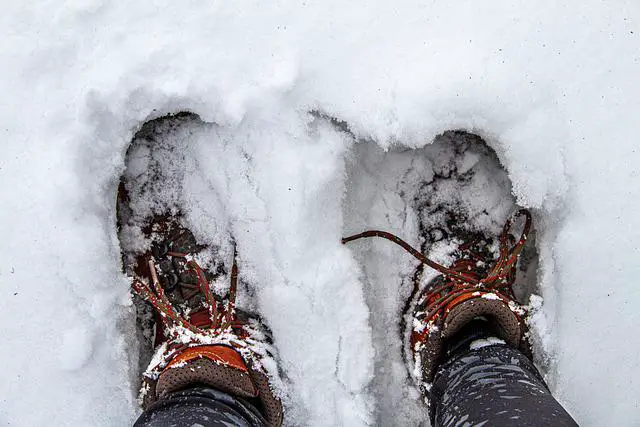Hiking in the snow tends to worry some hikers because of the special winter gear needed to stay protected, warm, and dry during the trips. You need to invest a lot of money and get special winter gear before you can hike in the snow.
I often get asked whether a hiker needs hiking boots or snow boots when hiking in the snow. Today, I have decided to talk more on this topic to help confused hikers decide on the type of boot they need for regular winter trips and winter hiking trips.
If you want to learn more on the topic, stick around for the complete guide!

Hiking Boots vs. Snow Boots - Quick Comparison
If I were to compare hiking boots with snow boots, I would have to clarify one thing from the beginning. You cannot compare any hiking boot to a snow boot – you need special winter or mountaineering boots you would use for extreme winter hiking. Any other type of hiking boot would not be acceptable for winter hikes.
If that is clear, I can compare these two types of boots further to say they are more similar than you would expect. Both types of boots offer excellent waterproofing, traction, insulation, and what else not. Also, both have inevitable setbacks that a person needs to know before getting the shoes.
Ultimately, what type of boot you get for yourself will depend on your preference and needs. You are better off getting winter hiking boots if you are a hiker. If you plan to take regular walks or trips in the snow, you can also use a decent pair of snow boots.
To learn more about hiking and snow boots, you should look into the following sections, where I dive into their characteristics in more detail.

Are Hiking Boots Good For Snow? [Pros & Cons]
It can be quite an investment to get separate winter hiking boots, regular hiking shoes, and a pair of snow boots. Not everyone will be able to get all types of boots. Some hikers even wonder if they can take their hiking boots out in the snow.
The answer is yes and no – yes because winter hiking boots are great for more extreme winter hiking, and no because not all hiking boots are suitable for snow. For now, let’s focus on winter hiking boots and see what makes them good and what makes them wrong for snowy trips:
Pros
Good traction: Hiking boots can have excellent traction, making them perfect for climbing mountains during the winter. The traction of the rubber sole will keep your feet from slipping, so you will not have to worry about falling and injuring yourself.
Waterproof and water-repellent: Many winter hiking boots are made from water-repellent material. Even regular hiking shoes come with waterproofing, making them suitable for wet conditions. While not all hiking boots are suitable for deep snow, they can offer enough protection from light snow and rain.
Lightweight: Hiking boots are generally lightweight, as all outdoor hiking gear is. The lightness of the hiking boots might be one of the best advantages of snow boots, so that is something to remember.
Breathable: Hiking boots are also breathable in most cases. Even when made for winter and deep snow, they will have openings that allow the foot to breathe. Since feet naturally sweat in all kinds of shoes and all weather, you can benefit from having shoes with good breathability.
Comfortable: Most hiking boots are comfortable for snow, but that does not go for all. Special winter boots will be most comfortable for snowy weather, whereas regular hiking boots will be less comfortable.
Good insulation: Winter hiking boots also offer excellent insulation, keeping your feet warm and protected during all winter hikes.
Ankle support: If the hiking shoe extends above the ankle and has a tight collar, chances are it will provide you with excellent ankle support. Since snow can be uncomfortable to walk on, you can use the extra protection and support to ensure you do not suffer an injury.
Cons
When walking on snow with regular hiking boots, you will experience bad ankle support, perhaps not enough waterproofing, and some comfort problems. If you want to take hiking boots out in the snow, ensure they are suitable for winter weather and snowy terrain first!

Are Snow Boots Good For Hiking? [Pros & Cons]
Snow boots are great for winter temperatures and walking in the snow. They are also suitable for winter hikes but are not the best for hikes in warm weather. Here are some of the pros and cons of wearing snow boots on hikes:
Pros
Good traction: Even a regular street snow boot will have good traction. Snow and frost are common during winter, so you need traction to stay on your feet. The traction will protect you on the street or in the Rocky Mountains. So, the traction makes snow boots suitable for hikes, whether it is fall, winter, or early spring.
Good insulation: Insulation is also essential in snow boots, as the snow can soak your feet fast. When hiking in cold weather, you will need insulated boots, and snow boots can be just the thing to keep your feet dry. The worst thing that could happen to you is having wet feet when it is cold outside – this recipe for a severe cold.
Ankle support: Most snow boots have a high ankle collar and tight cuff, keeping your leg from twisting even if you fall or slip. Sturdy ankle support on snow boots will protect your ankles, while boots with bad ankle support will create painful pressure points on your legs and feet. So, always go for comfortable ankle support in all your shoes.
Waterproof: Snow boots are always waterproof, whereas some boots are also water-repellent. You can wear such boots when hiking in the snow and in regular weather. Waterproofing is always essential, as you never know which hike will be cut short by a downpour.
Cons
Snow boots are not suitable for hiking trips in warm weather because they have too much insulation and are not breathable. They can be pretty uncomfortable for all hiking trips because they are very heavy and wrap tight around your feet. While you might overlook the comfort and heaviness during winter trips, you will not be able to do the same on warm-weather hikes.
The best thing would be to use snow boots for winter hiking trips and regular winter trips. They will not be needed for any other kind of trip, especially not a journey in warm weather.
Wrap-Up
After seeing the pros and cons of hiking boots and snow boots, I bet you know what type of boot is better for you. Do not listen to someone’s advice – listen to your gut feeling, think about your needs and the type of trips you plan to take, and then decide on the type of boots you want to get. Do not forget to let me know whether you choose hiking or snow boots – I cannot wait to read all about it!
- Are Merrell Shoes Good? – An Unbiased Review of Merrell Footwear - December 9, 2023
- Where Are Merrell Shoes Made? - December 9, 2023
- Camping in 40-degree Weather: Tips and Tricks - September 25, 2023

![Are Hiking Boots Good For Snow? [Everything You Need To Know] Are Hiking Boots Good For Snow? [Everything You Need To Know]](https://grandcircletrails.com/wp-content/uploads/2021/11/Are-Hiking-Boots-Good-For-Snow-1-150x150.jpg)
![Columbia vs Patagonia vs North Face [Comparison Guide] Columbia vs Patagonia vs North Face [Comparison Guide]](https://grandcircletrails.com/wp-content/uploads/2022/05/hiking-in-the-nature-1-150x150.jpg)



